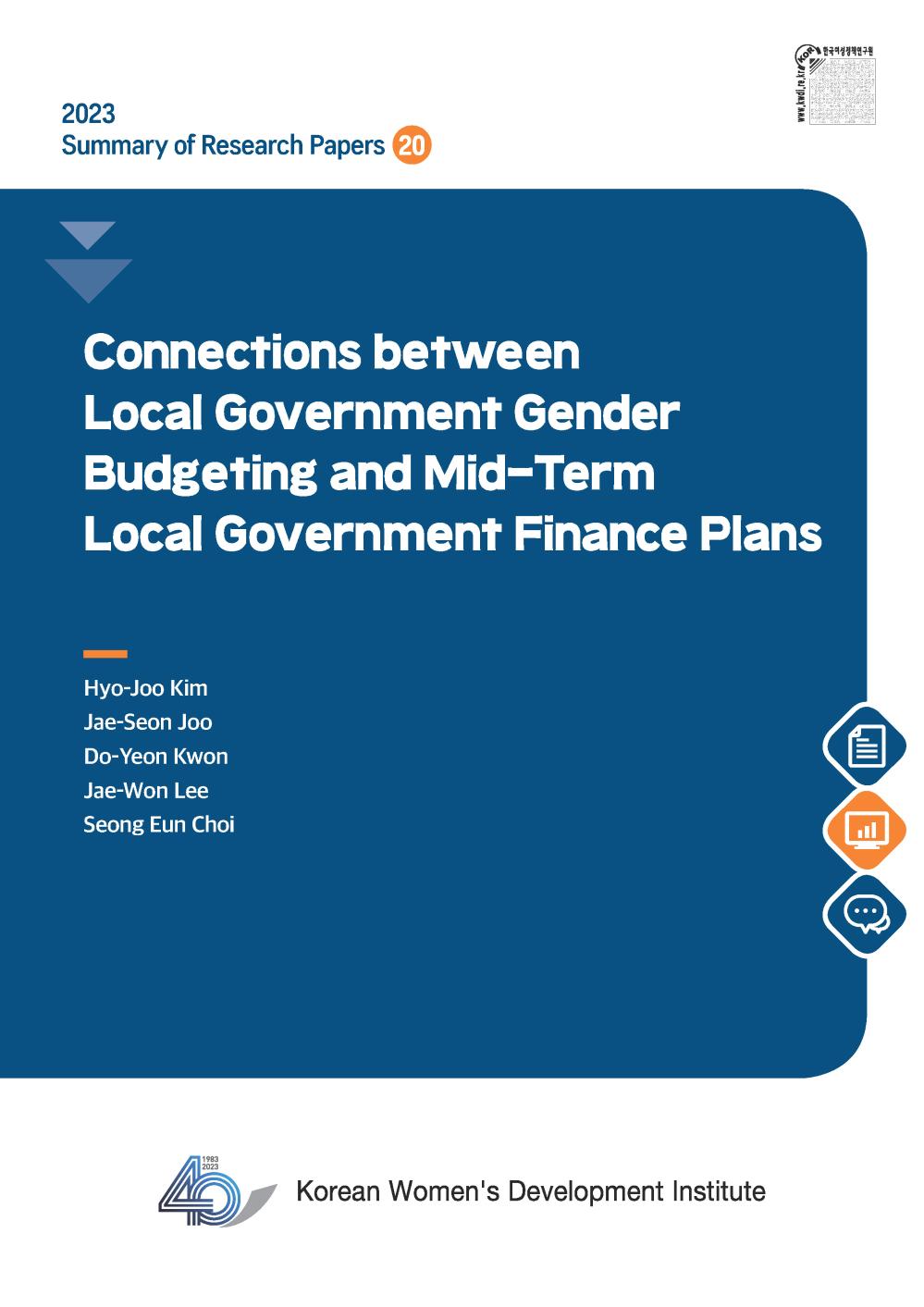Report
| A Study on the Linkage of Local Government Gender Budgeting and the Medium-term Local Government Finance Plan | |||
|---|---|---|---|
| Type | Basic | Period | 2023 |
| Manager | Hyo-Joo Kim | Date | 2023-12-29 |
| Fiie | 20_지방 성인지예산제도와 중기지방재정계획의 연계방안.pdf ( 1.95 MB ) | ||
|
Abstract A Study on the Linkage of Local Government Gender Budgeting and the Medium-term Local Government Finance Plan Hyo-Joo Kim Jae-Seon Joo Do-Yeon Kwon Jae-Won Lee Seong Eun Choi
Until now, gender budgeting at the local government level has been implemented centering on the preparation of gender budget statements. However, this approach has two limitations. First, because it is implemented focusing on individual programs and does not take an approach from the aspect of overall fiscal management, there is a lack of mid- to long-term vision or strategy. Secondly, as it adopts a one-year budgeting method, there is little connection with the medium-term local government finance plan.
As a policy alternative to this problem, this study examines the connection between gender budgeting at the local government level and the medium-term local government finance plan. The medium-term plan is a five-year plan established by forecasting revenue and expenditure demand in the mid- to long-term for the management of local government finance, which is the foundation on which local government finance management planning such as investment appraisal, budget formulation, etc. is carried out. In this study, we show that gender budgeting at the local government level and the medium-term local government finance plan should be linked in terms of three aspects.
First, some changes are necessary in gender budgeting at the local government level. After the introduction of gender budgeting at the local government level (FY 2013), although the number of target programs and the size of the budget increased significantly, there was no significant change in government officials' perception of gender equality. In addition, as it was found that the gender budget statement was not properly utilized in the budget process, we believe that some changes in the current approach need to be made. These include linkage with the medium-term local government finance plan. The logic behind this argument is that the medium-term plan is a policy tool that can systematically organize and strategically operate the budget for gender equality in this current period of fiscal austerity. Second is the necessity of mainstreaming a gender-sensitive perspective into the medium-term local government finance plan. Gender equality is one of the values that the government should reflect in managing its finances, among other factors such as region and income. Third is the need for linkage between budget practices and major fiscal systems. Compared to other budget practices, gender budgeting has different institutional characteristics in terms of purpose, background, function, and content, and is characterized by being operated separately. However, in order to enhance efficiency and accountability of budget management, it is desirable that it be operated in connection with major fiscal practices within the overall budget system. In particular, since most of the programs subject to local gender budgeting are government-subsidized programs or programs with continuity, and programs that cause a gap in benefits from a mid- to long-term perspective, linkage between the medium-term local government finance plan and gender budgeting is required.
Looking at the current state of linkage between local government gender budgeting and the medium-term local government finance plan, linkages between the two are being made in some regions. Gender equality is reflected in the medium-term local government finance plan, and content is included in ordinances on gender budgeting or gender equality. However, this is limited to certain regions, and Jeju Special Self-Governing Province is the only region where actual linkages are made.
Based on the necessity of linking local government gender budgeting and the medium-term local government finance plan, an FGI survey is conducted as part of this study to search for a method to connect the two. The subjects of the survey were 20 government officials in charge of gender budgeting and the medium-term local government finance plan. As a result of the survey, they acknowledged the necessity of linking the two systems, but were concerned about the subsequent increase in their work burden. In addition, a currently applicable linkage plan between the two is derived, focusing on Gyeonggi-do and Sejong Special Self-Governing City.
Combining these results, this study proposes two linkage plans. The first is a plan to improve the preparation guidelines of local gender budget statements so that gender equality goals are established as mid- to long-term goals over five years, and performance goals are established and managed accordingly. The second is to amend the 「Local Finance Act」 and the 「Establishment Criteria of the Medium-term Local Government Finance Plan」 to make linkages between the two compulsory, but make it so that the specific method is applied autonomously according to regional circumstances. It is expected that through such linkages, discussions from a macroscopic perspective on gender budgeting will take place, and the perspective and scope of gender budgeting will be expanded.
Research areas: Local government gender budgeting, medium-term local government finance plan Keywords: Local government gender budgeting, medium-term local government finance plan, linkage between systems |
|||
